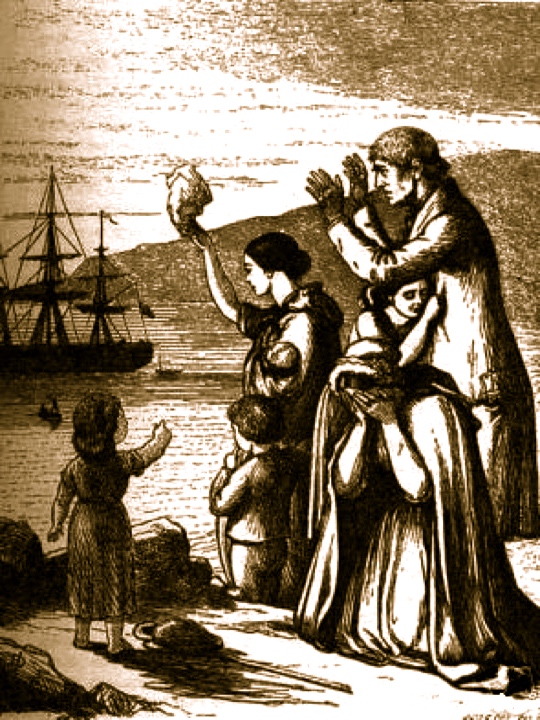
The great Irish emigration song ‘Paddy’s green shamrock shore’, popularized by Paul Brady, begins with the lines:
From Derry quay, we sailed away on the twenty-third of May
We were boarded by a pleasant crew bound for Amerikay
The song tells us that those passengers ‘safely reached the other side in three and twenty days’. What follows is a very different story of Derry quay, one that ended in the tragic deaths of seventy-two emigrants.
In the mid nineteenth century, the paddle-steamer Londonderry, belonging to the North-West of Ireland Steam Packet Company, and manned by a largely Scottish crew, plied a regular route between Sligo and Liverpool. Most of her passengers were set to sail onwards from Liverpool to North America.
In late November of 1848 the steamer was approaching Derry, on the first leg of its journey to England, with around one hundred and eighty passengers—mostly in steerage—and twenty-six crew. The bulk of the passengers were impoverished Mayo and Sligo farmers, and their families, fleeing the ravages of the Great Famine.
A sudden storm prompted the Captain, Alexander Johnstone, to order his crew to force all the passengers into a small aft cabin, measuring about eighteen feet in length and, at most, twelve feet wide. More than one hundred and seventy men, women and children were crammed into this tiny space. The situation was exacerbated when the only ventilation available was covered with a tarpaulin, to ensure that water did not get into the cabin. As a result, many of the passengers began to suffocate. Finally, one of them managed to escape and tell the first mate that the steerage passengers were dying from want of air. A reporter from the Belfast Newsletter described what the crew found when the cabin door was opened:
‘There lay, in heaps, the living, the dying, and the dead, one frightful mass of mingled agony and death. Men, women, and children, were huddled together, blackened with suffocation, distorted by convulsions, bruised and bleeding from the desperate struggle for existence which preceded the moment when exhausted nature resigned the strife.’
All told, seventy-two passengers, thirty-one women, twenty-three men and eighteen children, had died horribly. Wild rumours began to circulate when the steamer pulled into Derry. It was reported that:
A large number of passengers had been barbarously butchered by a band of robbers, who took passage with them for the sake of plundering the poor emigrants, and, in short, that one of the most frightful massacres on record had been perpetrated.
The authorities were initially inclined to blame criminality for the tragedy. The official narrative that emerged was of belligerent Irish passengers rioting and killing each other. The full truth came out at the inquest, where survivors accused the Scottish crew of extreme cruelty, and the captain insisted in his defence that he had given orders for the decks to be cleared for the safety of the passengers.
One fortunate survivor, Michael Branan from Sligo, told the inquest that he had been on deck when one of the crew cursed him and forced him down below, where, as he put it;
‘The place was so thronged that, while those at the sides were obliged to sit down, there was no sitting room for those in the centre, and they were moved to and fro with every motion of the vessel.’
A local doctor giving evidence, compared the steerage accommodation to the Black Hole of Calcutta. Other witnesses alleged that cattle being transported from Sligo had been better treated than the steerage passengers.
The Captain and two mates were found guilty of manslaughter by the inquest jury. The jurors also called the attention of proprietors of steamboats to what it called:
‘The urgent necessity of introducing some more effective mode of ventilation in steerage and also affording better accommodation to the poorer class of passengers.’
However, the call fell on deaf ears, and no remedial legislation followed.
In 1996 six coffins were found by workmen on a building site in the Waterside area of Derry, in grounds close to the former workhouse. They were believed to be the remains of some of the poverty-stricken travellers from the ill-fated paddle steamer.
The Londonderry pulled into Derry quay, with seventy-two dead passengers on board, one hundred and sixty-nine years ago, on this day.
You must be logged in to post a comment.